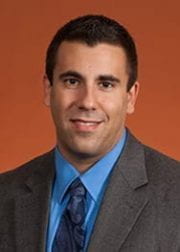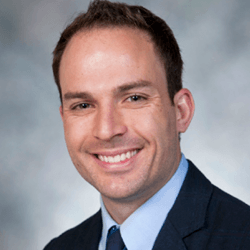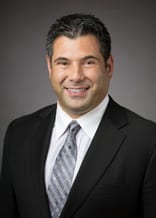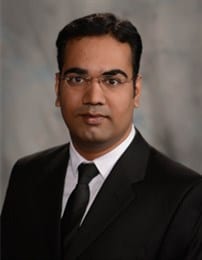Adam Feinberg, Ph.D.
Associate Professor of Materials Science & Engineering and Biomedical Engineering, Carnegie Mellon University
Biography: Dr. Feinberg earned a BS in Materials Science and Engineering from Cornell University in 1999, followed by a Masters (2002) and Ph.D. (2004) in Biomedical Engineering from the University of Florida, where his doctoral work was focused on engineering cell-material interactions to prevent and enhance adhesion. He was then a Postdoctoral Fellow at Harvard University from 2005 to 2010, where he developed new biomaterials and cardiac tissue engineering strategies for 3-dimensional myocardial regeneration, with a focus on stem cell-based approaches. Dr. Feinberg joined CMU in the fall of 2010 as an Assistant Professor with joint appointments in Biomedical Engineering and Materials Science and Engineering.
William E. Cohn, MD
Vice President, Johnson & Johnson Innovation
Biography: Dr. William E. “Billy” Cohn is the Vice President for Johnson & Johnson Medical Devices Companies and the Executive Director of the new Center for Device Innovation at the Texas Medical Center in Houston. Dr. Cohn has a passion for medical device development and has more than 90 US patents granted or pending for his medical innovations that have provided the core technology for six venture-backed medical start-ups.. He is the co-director of the Cullen Cardiovascular Research Laboratory and an Associate Professor of Surgery at Baylor College of Medicine and Adjunct Professor of Bioengineering at The University of Houston. Dr. Cohn received his undergraduate degree from Oberlin College, and received his medical degree from Baylor College of Medicine, where he remained for general surgical and cardiothoracic surgical residency training and where he served as the last chief resident under the legendary Michael DeBakey. After graduation, he took a teaching position at Harvard Medical School where he rose to the rank of Associate Professor of Surgery and served as an attending cardiothoracic surgeon and Director of Minimally Invasive Surgery at the Beth Israel Deaconess Medical Center for eleven years. Now at the Texas Heart Institute, Dr. Cohn has a busy surgical practice, and is part of the surgical heart failure team which specializes in implantation of mechanical pumps to support the failing heart and heart transplantation. With a passion for medical device development, Dr. Cohn has more than 40 U.S. patents awarded or pending for his medical innovations and has been honored as the Distinguished Inventor of the Year by the Intellectual Property Owners Association. When he is not operating or inventing new medical devices, he can be found playing at local Houston bars with blues legend Little Joe Washington, or practicing close-up magic.
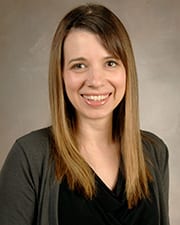
Rachael Sirianni, Ph.D.
Assistant Professor, UTHealth Medical School
Biography: Dr. Rachael Sirianni earned her doctorate in Biomedical Engineering at Yale University in 2008, during which time she developed models of drug delivery from polymeric biomaterials. She completed a postdoctoral fellowship in Diagnostic Radiology at the Yale School of Medicine, developing novel imaging techniques to track the distribution of polymers in the central nervous system. Her doctoral and postdoctoral works were supported by interdisciplinary training grants from the National Institutes of Health and bridged topics including polymeric drug delivery, transport modeling, neurobiology, and imaging. Dr. Sirianni took her first faculty position in 2011 at the Barrow Neurological Institute, where her laboratory focused on drug delivery and tissue engineering for the treatment of central nervous system disorders. She joined the Department of Neurosurgery at UT in 2018. Her research program here is focused on engineering drug loaded nanoparticles for intrathecal and intraventricular drug delivery in Pediatric Neuro-Oncology.
Jacob T. Robinson
Assistant Professor, Electrical and Computer Engineering and Bioengineering, Rice University
Jacob Robinson received a B.S. in Physics from UCLA in 2003 and a Ph.D. in Applied Physics from Cornell University in 2008 under advisor Dr. Michal Lipson. After completing his Ph.D.studying silicon nanophotonics he began postdoctoral research in the Department of Chemistry and Chemical Biology at Harvard University. While at Harvard, Jacob developed silicon nanowire devices to probe the electrical and chemical activity of living cells. In the summer of 2012, he joined the ECE and BioE departments at Rice. He is currently interested in developing nanofabricated devices to study the structural and functional dynamics of living neural circuits.
Omid Veiseh, Ph.D.
Assistant Professor and CPRIT Scholar in Cancer Research, Department of Bioengineering, Rice University
Dr. Omid Veiseh, Ph.D., iGahas an Assistant Professor and CPRIT Scholar in Cancer Research in the Department of Bioengineering at Rice University. He is also the co-founder of Sigilon Therapeutics, a Cambridge, MA- based biopharmaceutical company that discovers and develops immune-privileged living therapeutic implants for the treatment of chronic diseases.Dr. Veiseh received a dual Ph.D. in Materials Science & Engineering and Nanotechnology from the University of Washington. He completed his postdoctoral research with Prof. Robert Langer and Prof. Daniel Anderson at MIT and Harvard Medical School. Over the course of his career he has authored, or co-authored more than 50 peer-reviewed publications including those in Nature, Nature Biotechnology, Nature Materials, Nature Medicine, Nature Biomedical Engineering and is an inventor on 20 pending or awarded patents, many of which have been licensed for commercialization by 3 separate biotechnology companies. He has received numerous awards and fellowships including: a $2 million CPRIT Scholar In Cancer Research Award from state of Texas, and was recently named one of MedTech Boston’s 40 Under 40 Healthcare Innovators for 2017.
Akhilesh Gaharwar, Ph.D.
Assistant Professor, Department of Biomedical Engineering, Texas A&M University
Dr. Akhilesh K. Gaharwar is an assistant professor in the Department of Biomedical Engineering at Texas A&M University. Dr. Gaharwar’s laboratory “Inspired Nanomaterials and Tissue Engineering (iNanoTE)” is developing advanced nanostructure for functional tissue engineering. The goal of his lab is to understand the cell-nanomaterials interactions and to develop nanoengineered strategies for modulating stem cell behavior for repair and regeneration of damaged tissue. In particular, his lab is leveraging principles from materials science, stem cell biology, additive biomanufacturing and high throughput genomics to design nanoengineered biomaterials, with wide-ranging applications in the field of regenerative medicine. His lab has developed approaches to direct stem cells differentiation by modulating the biophysical and biochemical characteristics of nanoengineered biomaterials. Dr. Gaharwar has published 70+ high-impact journal articles, two-issued/pending patents, five book chapter, and more than 100 conference presentations and have H-index of 30. He edited two books and is editorial board member of “Bioprinting”. Over 14 major international awards have recognized Dr. Gaharwar’s interdisciplinary research. He receives awards from three major societies: biomedical (2011 BMES Graduate Award, 2013 CMBE – BMES Rising Star/Fellows), materials science (2011 MRS Silver Award), and biomaterials (2010 Society For Biomaterials – STAR). He is also named as 2015 Young Innovator by CMBE-BMES. He was awarded the prestigious “2010 Dimitris N. Chorafas Foundation Award” for an outstanding Ph.D dissertation. Other notable awards include “2011 ACTA Student Award”, “2005 DAAD Fellowship” and “2004 MHRD Scholarship”.


